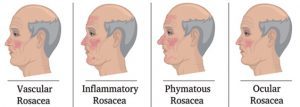By Joseph Onorato, MD, FAAD
 What is rosacea?
What is rosacea?
Rosacea is a common skin condition that occurs on the face. It causes redness and small bumps that are similar to acne.
Symptoms of rosacea?
The first sign of rosacea often is redness. It may appear like a blush or sunburn across your nose, cheeks, forehead, or chin. Other symptoms include red or pus-filled bumps and small blood vessels. For some people, the skin of their nose may become red, thick, and swollen. This is caused by excess tissue and called rhinophyma. Rosacea also can affect your eyes, making them red or watery. It may irritate and inflame your eyelids and the white part of your eye. This is called conjunctivitis.
Who Gets Rosacea?
Rosacea is common. According to the U.S. government, more than 14 million people are living with rosacea. Most people who get rosacea are:
• Between 30 and 50 years of age
• Fair-skinned, and often have blonde hair and blue eyes
• From Celtic or Scandinavian ancestry
• Likely to have someone in their family tree with rosacea or severe acne
• Likely to have had lots of acne — or acne cysts
and/or nodules
Women are a bit more likely than men to get rosacea. Women, however, are not as likely as men to get severe rosacea. People of all colors and ages can get rosacea.
What Causes It?
Doctors don’t know exactly what causes rosacea. A few things that may play a role are:
Your genes. Rosacea often runs in families.
Blood vessel trouble. The redness on your skin might be due to problems with blood vessels in your face. Sun damage could cause them to get wider, making them more visible.
Mites. They’re tiny insects. A type called Demodex folliculorum normally lives on your skin and usually isn’t harmful. Some people, though, have a heightened sensitivity to the mites, or more of these bugs than usual. Too many mites could irritate your skin.
Bacteria. A type called H. pylori normally lives in your gut. Some studies suggest this germ can raise the amount of a digestive hormone called gastrin, which might cause your skin to look flushed.
Can rosacea be prevented or avoided?
Since the cause of rosacea is unknown, you cannot prevent it. However, there are things you can do to avoid flare-ups. These include changes to your lifestyle and environment. Triggers vary by person and may take time to identify. Common triggers include:
• Direct or indirect heat, such as the sun or hot baths
• Weather, such as hot or freezing temperatures and strong winds
• Harsh skin care products
• Exercise or sweating
• Stress or anxiety
• Alcohol
• Certain foods
• Menopause
• Other skin or health conditions
Rosacea treatment
Medicine is the most common form of treatment for rosacea. The type of medicine your doctor recommends will depend on your symptoms. Medicines may include special antibiotics in the form of pills, gel, or cream. These work well at improving pimples and bumps. Skin redness is harder to treat.
It may take 2 months or more for treatment to work. As your symptoms improve, the amount of medicine you take may be cut down or stopped. It is hard to know how long you will need treatment for rosacea. Each person’s skin is different, and your doctor may want to adjust your treatment.
For severe cases of rosacea, surgery may be an option. It is most often done to treat rhinophyma. Enlarged blood vessels on your face can sometimes be removed with a fine electric needle or laser surgery.
Living with rosacea
Rosacea cannot be cured, but treatment can help relieve symptoms and improve skin appearance. Remember to always wear sunscreen. Avoid known triggers to prevent flare-ups. If left untreated, rosacea can get worse over time. This can have emotional and social effects. Some people lose self-esteem and don’t like to be seen in public because of the way they look. It is important to work with your doctor to treat symptoms and improve your quality of life.
Questions to ask your doctor
• How do I know if I have rosacea?
• What treatment is best for me and how does it work?
• How long does treatment last?
• Is it possible that my rosacea will go away on its own?
• How do I keep my symptoms from flaring up?
• What skin care routine is best for me?
• Will I always have rosacea?
What’s on YOUR Skin?
Contact SWFL Dermatology Plastic Surgery & Laser Center. Accepting most Florida & New York Insurance Plans including Florida Blue and GHI.
To improve the appearance and health of your skin, schedule a consultation today at SWFL Dermatology Plastic Surgery & Laser Center online or by phone at 239-500-SKIN.
Founder & Owner
Joseph Onorato, MD, FAAD
Dr. Onorato has over 25 years of experience practicing dermatology and is board certified. He serves as SWFL Dermatology’s medical director, encouraging his team to provide the best skin care services in the area. He focuses on general dermatology and dermatological surgery including laser treatments, chemical peels, and injectable fillers.
SWFLDermatology.com
13800 Tamiami Trail N, Suite 112
Naples, FL 34110
COVID SAFE
We strictly follow CDC guidelines










